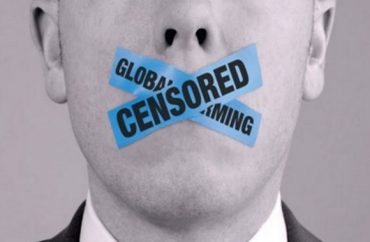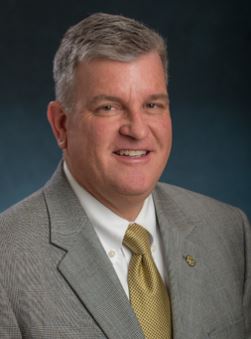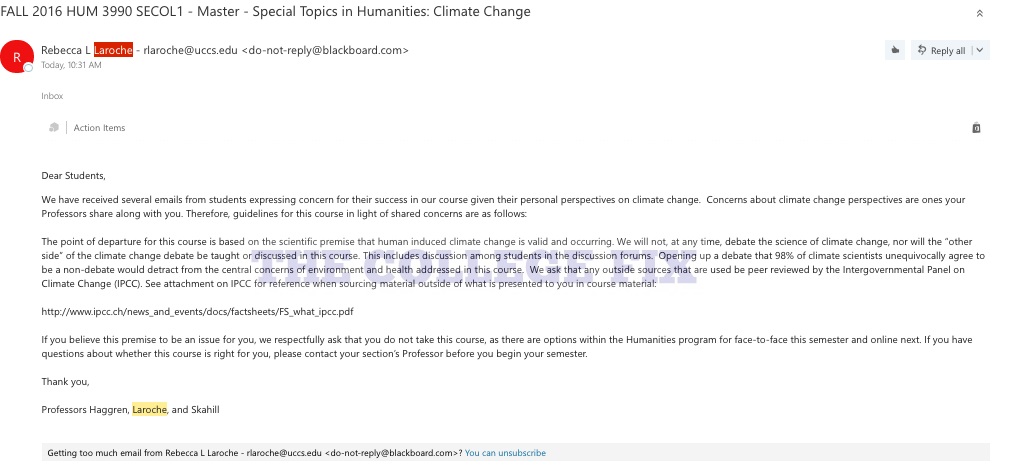
In the wake of national criticism over University of Colorado Colorado Springs professors telling students in an email to drop their class if they dispute man-made climate change, the institution’s Chancellor Pam Shockley-Zalabak has acknowledged the scholars were “ill-advised” and has apologized for the controversy the message created.
The professors’ email to students stated in part: “We will not, at any time, debate the science of climate change, nor will the ‘other side’ of the climate change debate be taught or discussed in this course. … If you believe this premise to be an issue for you, we respectfully ask that you do not take this course …”
At a University of Colorado Board of Regents meeting Friday, Shockley-Zalabak said “perceptions of censorship did occur and the email to the students was the basis of that perception. The email was ill-constructed and therefore ill-advised without further explanation and context.”
“The faculty and the administration have been advised by me of the need for much better communication in these types of circumstances. Specific cautions and concerns have been addressed,” she continued. “I am issuing an apology for the public concern that this has generated. I want to assure the board and others that UCCS continuously supports the highest of intellectual standards and academic freedom and freedom of expression.”
The regents – several of whom said at the meeting they fielded much concern from constituents over the email – also voted unanimously Friday to reaffirm the system’s commitment to academic freedom for both students and professors.
 “I think this is a teaching moment for the university and for our state because I’ve certainly heard a lot of feedback from constituents with concerns about it,” said Regent John Carson (pictured). “And, as you said, academic freedom obviously is very important. It’s very important that faculty feel that they have the right to teach as they see fit. But it’s also important that we respect students.”
“I think this is a teaching moment for the university and for our state because I’ve certainly heard a lot of feedback from constituents with concerns about it,” said Regent John Carson (pictured). “And, as you said, academic freedom obviously is very important. It’s very important that faculty feel that they have the right to teach as they see fit. But it’s also important that we respect students.”
The professors who wrote the email co-teach an online elective this fall called “Medical Humanities in the Digital Age.” They sent their email in August after some students voiced concern about their success in the course due to the scholars’ rigid stance on the origins of climate change.
The email stated “opening up a debate that 98% of climate scientists unequivocally agree to be a non-debate would detract from the central concerns of environment and health addressed in this course,” and added the ban against debating climate change extended to discussion among students in the online forums, too.

Chancellor: ‘Limiting debate … is appropriate’
The email was given to The College Fix, which reported on its contents in late August, prompting a massive backlash over concerns the professors’ were prohibiting open inquiry and free speech and teaching from a highly biased and narrow-minded perspective. A university spokesman, in response, stated the class is an elective and the professors were merely being honest and open with students.
Shockley-Zalabak, in her comments to the regents Friday, said an extensive investigation into the matter found that “no policy or legal violations had occurred.” She also disputes that censorship took place, and claimed it was not the professors’ intent to censor students.
At one point she even defended the email.
She said the course’s main focus is not climate change, therefore “limiting debate on topics not relative to the subject matter of a course is appropriate, particularly when it is an online course where the online debate entries, regardless of the topic area, are part of the graded assignments for a writing-intensive course.”
She said news reports quoting directly from the professors’ email did not “adequately represent” the full context of the course, and the email also “does not adequately explain why there was no debate on climate change, and used wording which contributed to the possibility that those reading The Fix and other publications could assume a form of censorship was taking place,” she said.
Shockley-Zalabak did not address in her statements what would have happened to students in the class who refuted man-made climate change had the email not gained national scorn.
In defense of academic freedom
Regent Carson, during the meeting, quoted the Regents’ laws, which defend the right to academic inquiry. He also spoke of the need for open debate and dialogue on campus.
 And Carson quoted from a University of Chicago statement which said that “education should not be intended to make people feel comfortable. It is meant to make them think. Universities should be expected to provide the conditions within which hard thought and therefore strong disagreement, independent judgment, and the questioning of several assumptions can flourish in an environment of the greatest freedom. … It is not the proper role of the university to shield individuals from ideas or opinions they find unwelcome, disagreeable, or even deeply offensive.”
And Carson quoted from a University of Chicago statement which said that “education should not be intended to make people feel comfortable. It is meant to make them think. Universities should be expected to provide the conditions within which hard thought and therefore strong disagreement, independent judgment, and the questioning of several assumptions can flourish in an environment of the greatest freedom. … It is not the proper role of the university to shield individuals from ideas or opinions they find unwelcome, disagreeable, or even deeply offensive.”
Several other board members also gave their thoughts with a general consensus that the emailing’s wording was deeply flawed, and that right action was taken by the university.
However one regent, Glen Gallegos, said it appears that maybe the public “overreacted,” and Colorado residents should be informed that “nothing out of the ordinary happened.”
Before the meeting moved on to enrollment data, a motion was made to reaffirm the principles of Article Five of the Board of Regents laws. It was passed with unanimous consent.
According to the university’s website, Article Five states in part: “The University of Colorado was created and is maintained to afford men and women a liberal education in the several branches of literature, arts, sciences, and the professions. These aims can be achieved only in that atmosphere of free inquiry and discussion, which has become a tradition of universities and is called ‘academic freedom,'”
“For this purpose, ‘academic freedom’ is defined as the freedom to inquire, discover, publish and teach truth as the faculty member sees it, subject to no control or authority save the control and authority of the rational methods by which truth is established.”
“Within the bounds of this definition, academic freedom requires that members of the faculty must have complete freedom to study, to learn, to do research, and to communicate the results of these pursuits to others. The students likewise must have freedom of study and discussion. The fullest exposure to conflicting opinions is the best insurance against error.”
Like The College Fix on Facebook / Follow us on Twitter
IMAGE: Brett Tatman/Flickr





Please join the conversation about our stories on Facebook, Twitter, Instagram, Reddit, MeWe, Rumble, Gab, Minds and Gettr.